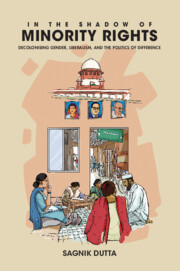4 - Estranged attachments: The carceral state and the everyday life of Muslim law
Published online by Cambridge University Press: 15 March 2025
Summary
A small room at the end of a courtyard housed the sharia adalat of the Indian Muslim Women's Movement (BMMA) in Mumbai. A group of men and women waited inside the room as the female judge (qazi) presided over cases. The female qazi usually sat in one corner of the rectangular room surrounded by some other activists of the BMMA as she heard cases of divorce, marriage and maintenance. Though this was an alternative dispute resolution forum meant to adjudicate Muslim personal law, the cases often included instances of criminal violations such as domestic violence. On the days when the shariat adalat was not hearing cases, this space hosted meetings with human rights organisations that trained women in approaching the police in instances of domestic violence. Stacks of leaflets and pamphlets provided by this human rights organisation lay in one corner of the sharia adalat. These resource materials provided details of how women citizens could access the police, how an FIR might be filed in a police station, and so on. These materials circulated within and beyond the shariat court. Activists of the BMMA distributed these materials to women who frequented the sharia court. They also distributed these materials in neighbourhoods in Mumbai where they conducted workshops on issues of gender equality and Muslim law with women. Some activists of the BMMA were also part of other activist networks. They frequented the meetings with senior police officials organised and facilitated by the members of the MCMT. In these meetings, activists exchanged pleasantries with police officials even as they recounted the difficulties that they faced in approaching the police. These events were held once a month in an auditorium where several activist groups and non-governmental organisations would assemble.
During the hearings of the cases, state laws were often invoked rhetorically by the qazi to convince men to pay post-divorce maintenance to their wives. The coercion of the state and state law remained an imminent threat, under the shadow of which marriage, divorce and maintenance claims were adjudicated by the female qazi. Deliberations on criminalising a certain form of oral, unilateral divorce by the right-wing BJP government found their way to the sharia adalat.
- Type
- Chapter
- Information
- In the Shadow of Minority RightsDecolonising Gender, Liberalism and the Politics of Difference, pp. 113 - 130Publisher: Cambridge University PressPrint publication year: 2025

